|
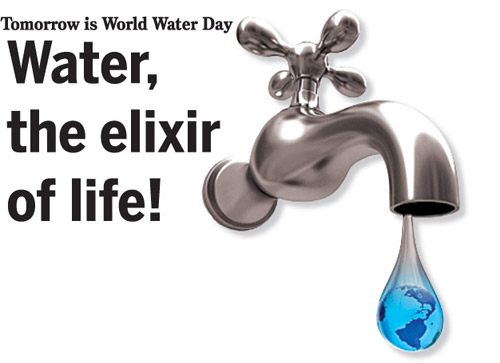
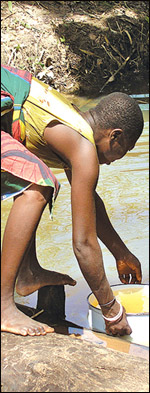  The
world's most precious natural resource, not in terms of monetary value,
but in terms of its utility value is undoubtedly water. The very
existence of Planet Earth and all life forms in it are totally dependent
on this precious liquid which is found in abundance on this planet. But,
unfortunately the human race has taken this natural resource for granted
and is exhausting it through overuse and pollution. The
world's most precious natural resource, not in terms of monetary value,
but in terms of its utility value is undoubtedly water. The very
existence of Planet Earth and all life forms in it are totally dependent
on this precious liquid which is found in abundance on this planet. But,
unfortunately the human race has taken this natural resource for granted
and is exhausting it through overuse and pollution.
None of the world's natural resources that we depend on for our
existence, ever increase in quantity to keep up with the needs of the
growing population. And water too, though available in abundance, is
such a limited resource that needs to be conserved and used carefully.
We are well aware of our dependency on this life-sustaining liquid, so
why pollute it and waste it? It is time we realised that by not managing
our water resources properly, we are only endangering our own lives and
that of the future generation too. Water is too precious to be wasted.
Let's check out some important facts about this valuable resource and
make a pledge to conserve it, especially as World Water Day will be
observed tomorrow.
The Earth's water resources are fast dwindling due to the increasing
demand for water following the growth of population around the world.
Even though there's plenty of water to be seen in the seas, rivers,
lakes and ponds, the amount of water suitable for drinking or cooking is
limited.
There are millions struggling to survive without water and globally
the water crisis is getting worse by the day.Like our ancestors,
especially King Parakramabahu who even built the famous Parakrama
Samudra realising the importance of utilising every drop of fresh water
without letting it mingle with the salty waters of the seas and going to
waste, we too need to wake up from our slumber and map out ways of
making the most of the freshwater resources in our country.
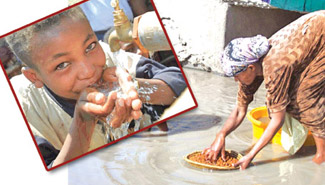
According to statistics, the total volume of water available on our
planet is about 1.4 billion km3. But this does not mean there's plenty
of water to quench our thirst and use for our daily needs. Of this total
volume of water, only around 35 million km3 (or just 2.5 per cent) of
water is fresh water. And the world's six billion people are using 54
per cent of all the freshwater found in rivers, lakes and underground
aquifers.
When one looks at the daily requirements of water of the world's
growing population, it is not surprising that there is a crisis at hand.
Apart from the fact that the freshwater resources are limited and not
sufficient to meet these requirement, what's alarming is the manner in
which the available resources of freshwater are being polluted. It has
been found that in developing countries alone about 70 per cent of
industrial waste are dumped, untreated, into waterways polluting the
usable water in such areas.
You must be aware by now that both man and animal can live without
food for days, but without water, for only a few days. So, think of all
the millions of people and even our dumb friends - the animals who are
dying without water. Waste not, want not' is a good maxim to follow.
When you go through the facts and statistic given here you'll comprehend
the need and urgency of conserving the globally available but limited
resources of freshwater for the continuity of life.
Remember, water is the 'elixir of life!'
Facts and pix: Internet
**********
Water-availability, use and related deaths
* For the first time in history, the number of people without an
improved source of water has dropped below one billion.... But this is
no reason to sit back and relax because the crisis isn't over.
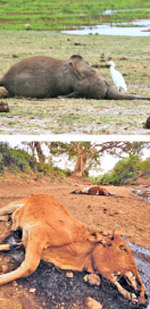
* Less than one per cent of the world's fresh water (about 0.007 per
cent all water) on Earth is readily accessible for direct human use.
* Around 3.575 million people die each year from water-related
diseases. And of , 43 per cent are due to diarrhoea.
* About 84 per cent of water-related deaths are of children between
the ages of 0-14.
* A majority of water-related deaths (about 98 per cent) occur in the
developing world.
* At any given time, more than half of the poor in the developing
world are ill from causes related to hygiene, sanitation and water
supply.
* Every 15 seconds a child dies from a water-related disease. About
1.4 million children die as a result of diarrhoea each year.
* Millions of children and women spend several hours a day collecting
water from not only distant but also often polluted sources which leads
to illnesses.
* Around 884 million people lack access to safe water supplies. This
is approximately one in eight people.
* The daily requirement for sanitation, bathing and cooking needs as
well as for survival is about 13.2 gallons per person.*
The UN says each person needs 20-50-litres of safe freshwater a day
to ensure their basic needs of cooking cleaning and drinking.
* Even though the daily drinking requirement per person is 2-4 litres,
it takes 2,000 to 5,000 litres of water to produce one person's daily
food.
**********
World Water Day theme
Clean Water for a Healthy World:
Every year, 1,500 cubic kilometres of wastewater are produced
globally.
While waste and waste water can be reused productively for energy and
irrigation, it usually is not.
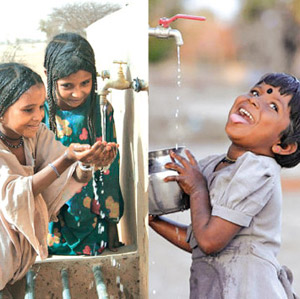
In developing countries 80 percent of all waste is being discharged
untreated, because of the lack of regulations and resources. Population
and industrial growth add new sources of pollution and increased demand
for clean water to the equation.
Human and environmental health, drinking and agricultural water
supplies for the present and future are at stake, still water pollution
rarely warrants mention as a pressing issue.
To do something about this the UN has chosen Clean Water for a
Healthy World as theme for World Water Day 2010.
The overall goal of the World Water Day on 22 March 2010 campaign is
to raise the profile of water quality at the political level so that
water quality considerations are made alongside those of water quantity.
It is still a reality that an estimated 1.1 billion people rely on
unsafe drinking-water sources. Therefore the theme of World Water Day
2010 is focusing on raising awareness of water quality. The
international observance of World Water Day is an initiative that grew
out of the 1992 United Nations Conference on Environment and Development
(UNCED) in Rio de Janeiro. |

